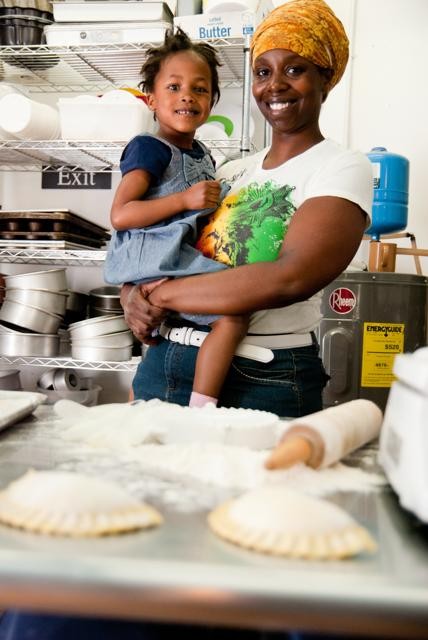- Stacy Joseph with her daughter, Makeda Max Cooper
- Maria De Souza Max Cooper
- Ghislaine Mahler Max Cooper
When Stacy Joseph was a kid, she spent her summers in Antigua, eating from her grandmother's cast-iron yabba pot. To her friends back in Hartford, Conn., the waist-high vessel might have evoked wicked witches with steaming cauldrons, but for Joseph, the yabba pot produced only delicious food.
She remembers how it sent up steam, carrying good smells, which brought the neighbors to the front yard, ready to join in the meal. “My family, up to this day, feeds a lot of the community,” she says. “Antigua is such a great place because everybody takes care of everybody.”
Just like her grandmother and her 10 aunts and uncles, most of whom still live on the island, Joseph has a knack for feeding people. She doesn't have a yabba pot yet — she's working her way up to that kind of volume — but she does have a stall at the French Broad Food Co-op Tailgate Market, where she sells patties (savory Caribbean-style pastries) as part of her catering company, Wadadli Dessert Oasis. (Wadadli is the Native American name for Antigua.)
The half-moon-shaped pockets of turmeric-spiced dough come filled with spicy vegetables and ackee, a West African fruit that's often grown in Jamaica.“People call them empanadas, but they're not,” Joseph says. “Empanadas are fried. Patties are baked. They're not of Latin American origin.”
At the markets, foreign food is easy to find. Prepared items are inspired by Thai, Argentinian, Venezuelan, Lebanese, French, Italian and Caribbean cooking.
Bridget Kennedy, program director at Appalachian Sustainable Agriculture Project, says the markets are a good forum for educating shoppers about food from afar. “The big advantage is getting to know your customers and getting to tell your story and giving them a sense of what's behind your product,” she says. “It's a totally different type of customer than somebody who is trying to pop into a restaurant really fast and grab some food.”
Modus shoperandi
The markets serve as business incubators for cooks who want to share dishes from other countries, just as they do for farmers, bakers and cheese makers. But open-air commerce harkens back to an older way of doing business, one that's perhaps more established in other countries.
After all, farmers markets have just started to become popular in the U.S. Since the USDA began tracking them in 1994, the numbers have grown by 450 percent. Today, the USDA recognizes nearly 8,000 markets.
“I think that there are century-old, deeply rooted, similar marketplaces, like a farmers market, in foreign countries, that were probably around long before the United States was ever an actual country,” Kennedy says.
That's not to say Americans didn't do markets. Lancaster Central Market in Pennsylvania has been open for 275 years, and Pike Place Market in Seattle has operated since 1907. But even these places are youngsters compared to Seoul's Namdaemun Market, founded in 1414, or London's Borough High Street, which has hosted fresh fruit and vegetable vendors since the 13th century.
But no matter where shoppers and vendors look for inspiration, turning to history is a good thing. “We're looking back at slower times and their food economies,” Kennedy says. “That's what farmers markets are bringing us back to, slowing us down.”
Grocery galavant
Joseph grew up visiting Antigua's open-air markets. She says her friends and neighbors assumed they would see each other while shopping on the weekends. “It's very communal: Everybody knows everybody,” she says. “There's one that's right by the harbor, so you get the catch of the day. People are scaling the fish in front of you.”
The Asheville markets have lots of room to grow if consumers are willing, Joseph says. For example, prepared foods abound at island markets, whereas they're just catching on here. “You can go into a market and spend a good four or five hours and not get hungry because you're snacking the whole time that you're there,” she says.
When Ghislaine Mahler was growing up in France, markets were similarly central. As the youngest of six children, she accompanied her mother to the markets in Paris twice a week to shop for the family. Many years later, as a traveler, she visited the Asheville City Market. “That brought me back to France,” she says. “There's a whole life to the market that I think is very unique.”
Now, she sells French pastries, tarts, quiches and soups at both locations of the Asheville City Market. Under the banner of Ma Belle France, she also teaches cooking classes for adults and hosts summer camps for kids in her north Asheville kitchen and classroom. But despite having the space and the recipes to set up a restaurant, Mahler says she'd rather stick to the markets. “I love the fact that you see so many people coming and the dogs and the kids,” she says. “Having a store wouldn't work for me.”
The stall encourages her to get to know her customers, she explains, and talking has advantages for them both. Her customers sometimes expect the food to be gourmet or overly rich, but Mahler explains the different styles of French cooking.
Her baked goods focus on simple flavors and keep the sugar low. “People have a lot of preconceived ideas about French food,” she says. “I get interesting remarks. And I get people who speak a little French who come to the table, and they absolutely want to speak French to me.”
Stomach outreach
At the West Asheville Tailgate Market, Maria De Souza's tamales come with instructions.
She sells frozen, vegetarian tamales, empanadas and churros for customers to reheat at home. The instructions focus on how to reheat them, but that's just the beginning of the information that De Souza keeps at the ready.
She's prepared to talk about ingredients, gluten-free eating and her native Venezuela. “I love to talk about stories, to talk about facts, mythology,” she says. “I'm very into Latin America. That's another reason I enjoy so much being in Latino food.”
De Souza used to own a restaurant in Weaverville, but those days are over, she says. “With the economy like it is, I don't want to do a restaurant,” she says. “I don't want to take a risk.”
Besides, she adds, the market is more personal than a restaurant. “In the market, we have one-to-one contact,” she says. “We're explaining a lot more. The market is a good place to get to know you better.”
De Souza visits markets in Weaverville, Mars Hill and east and West Asheville. She has enough time left over to fill orders for tamales, arepas and other Latin American dishes from her website, lagringatamalera.com, and keep up with her other side projects, which also focus on the Latino community. She keeps a booth at the Downtown Market on S. French Broad Avenue called Latin America Legacy, and she maintains a corresponding Facebook page that shares facts and articles about Latino culture. She also works as needed as a medical interpreter.
The markets help her connect with others, she explains, and that's the goal of all her projects. “Latin America has a very rich culture,” she says. “To me, it's very nice that others are getting interested in what we do. … I love [the market] because it's kind of like a teaching at the same time.”







Before you comment
The comments section is here to provide a platform for civil dialogue on the issues we face together as a local community. Xpress is committed to offering this platform for all voices, but when the tone of the discussion gets nasty or strays off topic, we believe many people choose not to participate. Xpress editors are determined to moderate comments to ensure a constructive interchange is maintained. All comments judged not to be in keeping with the spirit of civil discourse will be removed and repeat violators will be banned. See here for our terms of service. Thank you for being part of this effort to promote respectful discussion.